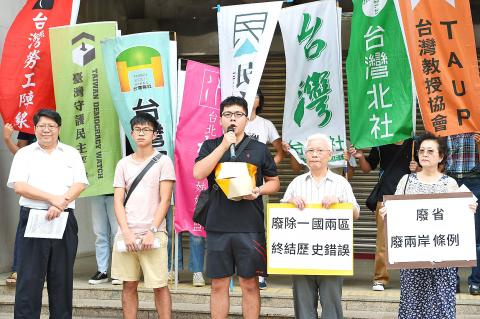The Legislative Yuan should initiate the final steps to abolish the Taiwan Provincial Government to follow up on a planned elimination of the Mongolian and Tibetan Affairs Commission, protesters said yesterday.
About a dozen members affiliated with the Economic Democracy Union and several other groups protested outside a Legislative Yuan side gate to demand that the Provincial Government’s budget be eliminated during the upcoming legislative session, followed by formal legal amendments to legislate it out of existence next year.
They also called for the Democratic Progressive Party (DPP) to make abolishing the Act Governing Relations Between the People of the Taiwan Area and the Mainland Area (臺灣地區與大陸地區人民關係條例) a platform plank during the next round of legislative elections.

Photo: Liao Chen-huei, Taipei Times
“We hope to make the sovereign power of Taiwanese collide with our Republic of China Constitution,” union spokesman Chien Nien-yu (簡年佑) said. “Legal changes by the Legislative Yuan can challenge inappropriate constitutional restrictions and create new energy for a new constitution or sweeping reform.”
The Republic of China Constitution was adopted by the Chinese Nationalist Party (KMT) government in Nanjing in 1947, with amendments restricting its application to the nation’s “free area” following the KMT’s defeat in the Chinese Civil War.
The Constitution mandates the existence of a provincial government while allowing for legislation to define its specific function and organization.
In practice, the provincial government has been “frozen” and largely non-functional since 1998, when it was drastically downsized.
Protesters yesterday compared it to an “appendix.”
“Even though the provincial government has been frozen for almost 20 years, it still employees more than 100 people across several different bodies, while wasting NT$240 million [US$7.98 million] in taxpayer dollars last year,” said union secretary-general Chen Kuan-yu (陳冠宇), who also announced plans to burn a pile of paper “gold ingots” at a vigil at Liberty Square on Monday night.
Protesters said the vigil date was selected because it corresponded with the 25th anniversary of the promulgation of the Act Governing Relations between the People of the Taiwan Area and the Mainland Area.
“It would not be enough just to amend the act to change references to ‘mainland area’ to ‘China’ and references to the ‘Taiwan area’ to ‘our country,’” Lai Chung-chiang (賴中強) said, calling for restrictions on executive power to regulate Chinese trade and investment.
“The key characteristic of the act is numerous blank checks allowing the executive branch to do as it pleases on a variety of issues where they should be governed by specific laws,” Lai said.
The law should be replaced with a China Relations Act in the medium term to allow transition for articles governing behavior of Chinese citizens to be written into individual legislative acts to mirror passages “for foreigners.”
“Right now, Chinese are legally considered special nationals of the Republic of China, but we want to change that to their being considered special foreigners,” he said, adding that his group does not advocate using a referendum to abolish the act.
Referendums have “more important uses,” he said.

Taiwan would welcome the return of Honduras as a diplomatic ally if its next president decides to make such a move, Minister of Foreign Affairs Lin Chia-lung (林佳龍) said yesterday. “Of course, we would welcome Honduras if they want to restore diplomatic ties with Taiwan after their elections,” Lin said at a meeting of the legislature’s Foreign Affairs and National Defense Committee, when asked to comment on statements made by two of the three Honduran presidential candidates during the presidential campaign in the Central American country. Taiwan is paying close attention to the region as a whole in the wake of a

President William Lai (賴清德) has appointed former vice president Chen Chien-jen (陳建仁) to attend the late Pope Francis’ funeral at the Vatican City on Saturday on his behalf, the Ministry of Foreign Affairs said today. The Holy See announced Francis’ funeral would take place on Saturday at 10am in St Peter’s Square. The ministry expressed condolences over Francis’ passing and said that Chen would represent Taiwan at the funeral and offer condolences in person. Taiwan and the Vatican have a long-standing and close diplomatic relationship, the ministry said. Both sides agreed to have Chen represent Taiwan at the funeral, given his Catholic identity and

Chinese Nationalist Party (KMT) Chairman Eric Chu (朱立倫), spokeswoman Yang Chih-yu (楊智伃) and Legislator Hsieh Lung-chieh (謝龍介) would be summoned by police for questioning for leading an illegal assembly on Thursday evening last week, Minister of the Interior Liu Shyh-fang (劉世芳) said today. The three KMT officials led an assembly outside the Taipei City Prosecutors’ Office, a restricted area where public assembly is not allowed, protesting the questioning of several KMT staff and searches of KMT headquarters and offices in a recall petition forgery case. Chu, Yang and Hsieh are all suspected of contravening the Assembly and Parade Act (集會遊行法) by holding

Lawmakers from the Democratic Progressive Party (DPP) yesterday established a friendship group with their counterparts in Ukraine to promote parliamentary exchanges between the two countries. A ceremony in Taipei for the Taiwan-Ukraine Parliamentary Friendship Association, initiated by DPP Legislator Chen Kuan-ting (陳冠廷), was attended by lawmakers and officials, including Deputy Minister of Foreign Affairs Francois Wu (吳志中) and European Economic and Trade Office in Taiwan Director Lutz Gullner. The increasingly dire situation in Ukraine is a global concern, and Taiwan cannot turn its back when the latter is in need of help, as the two countries share many common values and interests,